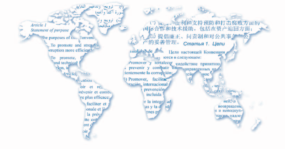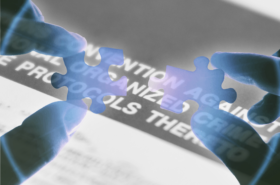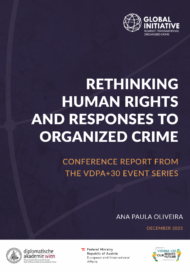Posted on 11 Oct 2018
With the ninth session of the UNTOC COP around the corner, has the convention had the practical impact that it promised?
What is the role of UNTOC for the global law-enforcement community? It seems like a counterintuitive question: if an international convention against transnational organized crime is to be of use to anyone, surely it should be for those working on the front line against criminal networks. Yet, from my own experience – first as an officer of the Scottish police service, then as a UN official working on law enforcement – it is far from evident that police forces around the world see UNTOC as a useful tool, or are even aware of its existence.
I spent 24 years of my professional life in policing, much of it dedicated to the investigation of serious crime (including transnational cases), before I became aware of the UN Office on Drugs and Crime, let alone UNTOC. I am sure my experience is not unique, and reflects what I see as insufficient consideration for the practical needs of law enforcement in pursuing organized-crime groups, both in the text of the convention itself and how it is implemented.
But perhaps my experience is not surprising. After all, few police officers will have any contact with INTERPOL during their career, just as most customs officers have no direct contact with the World Customs Organization (WCO), other than to use its Harmonized System, which establishes codes relevant to trade commodities.
The reality of day-to-day law enforcement, particularly for those tasked with responding to serious crime, is that it tends to be somewhat parochial. While detectives and investigators recognize that crime within their jurisdiction is connected to developments of an increasingly transnational nature, few have the time, resources or authority to pursue these connections. The workload is routinely horrendous and tends to be dictated mainly by the behaviour of persons living or operating within investigators’ jurisdictional boundaries. Unfortunately, for overstretched agencies, pursuing transnational connections often comes lower down in their priorities.
What makes international cooperation and information sharing easier, however – and any investigator would agree – is the establishment of trusted counterparts who will provide desperately needed information and can be relied on to act on intelligence offered to them. To do this, many countries have either established bodies that focus on transnational law enforcement or have required existing agencies to include this in their mandate, such as the US Federal Bureau of Investigation and Drug Enforcement Agency, and the UK’s National Crime Agency. Many nations also have law-enforcement officials – ‘legal liaison officers’, to use the diplomatic term – stationed in embassies, especially in countries where matters such as narcotics and human trafficking are relevant. These personnel can facilitate the sort of collaboration and trust that simply cannot be achieved by, for example, communicating with INTERPOL, the WCO or other channels of information exchange. The cooperation that routinely takes place among such officials regularly brings offenders to justice.
Many successes in the fight against transnational organized crime are born out of these essentially informal interactions. Various bodies, such as INTERPOL, the WCO, EUROPOL and the Southeast European Law Enforcement Center, can provide further opportunities for such liaison. UNTOC, per se, does not, so the convention has no bearing on this area of vital importance in global efforts to counter transnational organized crime.
Formal frameworks, such as mutual legal assistance (MLA) agreements, are also vital in supporting these informal cooperation relationships. It is widely recognized, however, that some investigators, and prosecutors too, are doing a poor job when it comes to preparing formal MLA requests. The result is that some requests are rejected, or there are demands for clarification and detail. The sheer number of such requests is leading to huge backlogs around the world, to the point that a sizeable number of prosecutions are stalled, awaiting responses to MLA requests. Some prosecutions have to be abandoned because evidence from abroad is not supplied quickly enough to meet time-bar provisions. The provisions set out by UNTOC do little to streamline this process.
Has UNTOC sidelined the international law-enforcement community?
To be frank, many of the treaty’s provisions, at least in law-enforcement terms, are blindingly obvious and do not require an international treaty to establish their importance. These include joint investigations (Article 19); special investigative techniques (Article 20); and collection, exchange and analysis of information on the nature of organized crime (Article 28). These articles provide little strategic guidance because national agencies already routinely engage in these activities.
Why is this the case? One explanation is that although UNTOC was drafted by well-intentioned and well-meaning individuals, several of whom had experience as prosecutors or judges, how many detectives, customs officials or other investigators took part in or were consulted over the drafting of the treaty? When it came to negotiating and agreeing on the convention’s text, it was primarily a matter for representatives of the permanent missions to the UN office in Vienna. How many of them included, then or now, representatives of their nation’s law-enforcement community? When they sought guidance, how often were their country’s customs or police experts consulted? How many law enforcers have participated in meetings of the Conference of the Parties to UNTOC? Given that law-enforcement representatives were not involved from the outset, perhaps it is not surprising that the treaty has not been designed with practical police work in mind.
Today, there are ongoing debates about how UNTOC is to be reviewed and its impact evaluated. Including input here from law-enforcement representatives would add some practical clarity to the debate. Perhaps it is time to move away from overly legalistic or academic discussions on UNTOC – after all, it is a convention against transnational organized crime. It is, realistically, probably impossible to measure the treaty’s impact on organized-crime groups. Instead, what we need to determine is whether the law-enforcement community finds it helpful. If it doesn’t, we should be worried. As someone who has been linked to law enforcement for over four decades, I suspect we need to be worried. For example, a recent edition of the Journal of the International Association of Chiefs of Police carried a special focus on transnational crime. While UNODC was referred to in several places, not a single mention was made of UNTOC.
So, where to from here? If most of UNTOC’s provisions are self-evident and simply spell out approaches and techniques that law-enforcement agencies around the world already implement routinely, then what is its purpose? It is perhaps to fill in the gaps and emphasize what needs to be done. It is perhaps to flag up to nations that are not combating organized crime effectively that they must do so urgently. For example, in my view, more nations and their enforcement agencies would do well to take greater account of Article 26 (which sets out measures to enhance cooperation with law-enforcement authorities) because experience has shown that it is by encouraging those within organized-crime groups to become witnesses for the state or crown that one often brings down such networks.
The global law-enforcement community is highly organized these days and, in many respects, has become something of a stand-alone lobby group, with the potential to influence political decision-making and policymaking. There is considerable scope for that community, where appropriate, to hold its political masters to account. If, for instance, a country has failed to fully implement the provisions of UNTOC, its law enforcers may be able to demand that it does. Although it is regrettable that the convention seems not to have had the front-line impact we might have hoped for, it is important that successful pressure by police leaders may realize its untapped potential.



